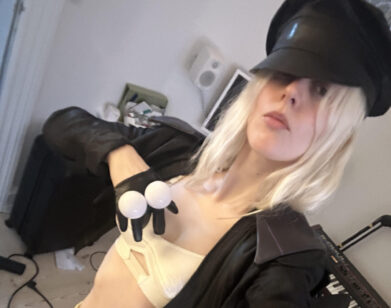Embrace death in style with this funeral playlist from funk trio Khruangbin

“Khruangbin” is a hard word to spell and pronounce. In Thai, it literally means “engine fly,” and it’s been adopted by Houston natives Laura Lee, Mark Speer, and Donald Johnson—under the moniker, they release arresting instrumental music that incorporates Thai funk, Middle Eastern psych, and American R&B influences. By the time the group gained enough notoriety for questions about spelling and pronunciation to arise, they were too popular to change their unwieldy name without confusing their growing fanbase. So, they kept it.
Guitarist Mark Speer elaborates: “It’s really surreal. When we first started the band we did not think the name was even anything people would remember—we didn’t think people would care, so why bother, just call it what we want. So we did! And then all this stuff started happening, and now it’s like, ‘We can’t change it now!’”
So here they are, with Speer on guitar, Lee on bass, and Johnson on drums. With Con Todo El Mundo, their just-released second album (and first for the venerable Dead Oceans label), the group attempted to walk a fine line, balancing low-key recording sessions in a Texas barn with the heightened expectations of their feverish, devoted following. The trio are out to prove that they’re more than the sum of their influences, notably the Thai funk style that characterized their debut, The Universe Smiles Upon You. “Going into this one we wanted to not just focus on Thai music,” Lee explains. “For one, we didn’t want to do a disservice to Thai music, but also we didn’t want to get pigeonholed as being a band that only listens to Thai music, because we listen to music from everywhere.”
On Con Todo El Mundo, the influences are numerous and global; the title is an ode to Lee’s Mexican-American grandfather, and the music plays with themes prevalent in Middle Eastern—specifically Iranian—music. It’s an album indebted to these roots, but even more so, it’s an assured blend of Khruangbin’s signature grooving rhythms and catchy, melodic instrumentation. If they were too popular to change their name after The Universe Smiles Upon You, there’s certainly no looking back after this one.
“Someday We’ll All Be Free,” Donny Hathaway
LAURA LEE: This has always been my funeral song. I remember hearing it and knowing how he died [from suicide], and it made so much sense to me. It makes me cry every time. It’s beautiful. His voice is insanely powerful, moving, and it feels like in that song the freedom is death, or a new life.
MARK SPEER: I played in church for a long, long time, and that song was played a lot, sometimes even at funerals. Every time we played it I always cried. I wasn’t even singing it. I was just doing the guitar parts. It’s just one of those really, really powerful songs, that no matter who’s playing it, it speaks.
“Lush Life,” John Coltrane and Johnny Hartman
SPEER: Coltrane wrote this song in his early twenties and it’s got this world weary, worn sound to it. It’s like, man, this guy wrote this when he was a kid. It’s a big song for me. It’s one of the first cuts that I couldn’t stop listening to over, and over, and over again. I got into it when I first started pursuing becoming a professional musician, being around that scene and seeing how exciting it can be at first, then it kind of becomes a drag. You’re playing at seedy bars every night and dealing with the same kind of folks. It’s this romanticized version of having the blues. There’s something really satisfying about the lyrics of the song, and Johnny Hartman’s lyrics are amazing.
“Clair de Lune,” Kamasi Washington
LEE: I don’t listen to that much current music, which is something I’m trying to change. That album was one I really loved. I kind of go through waves where I have a particular song that takes me out of wherever I am, and “Clair de Lune” just allows me to escape to some beautiful, reflective place. I would love for people to reflect on me, reflecting on that song.
SPEER: Beautiful music is always good [laughs].
“Dedicada A Ela,” Arthur Verocai
SPEER: The atmosphere of this song is what gets me. It’s very reflective and meditative.
LEE: It’s a really psychedelic, somber, beautiful song. We learned it and played it in Brazil when we went there, so it’s sort of important to the band, I think.
SPEER: It’s one of the first songs we played overseas outside of Europe, somewhere we had never been before. We wanted to play a Brazilian song we’d been listening to for years … Had to do it.
“My Life,” Noriko Miyamoto
SPEER: She sings in English on this one. The lyrics seem to imply reaching the end of your life and realizing, ‘I did my best.’ Flying over, looking down on your life, getting ready for the next phase—possibly implying reincarnation. It’s a really beautiful song. There’s something about the way people who don’t necessarily speak English as their first language write lyrics … It becomes that much more metaphorical and it makes the interpretations endless. They’re not so literal. I could be totally wrong, but that’s what it sounds like to me.
“He Laid His Hands On Me,” Lee Williams and the Spiritual QC’s
LEE: We wanted to have a happier song.
SPEER: Well, definitely something big. I played an awful lot of gospel music coming up, and this is one of my favorite songs of all-time from that genre.
LEE: It’s a song where people would stand up, clap, and dance. Some people would also be crying. It’s one of those songs. It’s fun, but really powerful.
SPEER: It has such beautiful harmonies. I don’t know how to describe the music. I’ve been playing it for over 15 years, but it’s more of a feel thing.
“Zionsville,” Khruangbin
LEE: We wanted one of our own songs to close out our funeral. This is the last track off of our first record. It closes out the album, so I guess it would be our funeral. It’s just an instrumental, pretty song. If you’re remembering us, this is what we left in the world.






